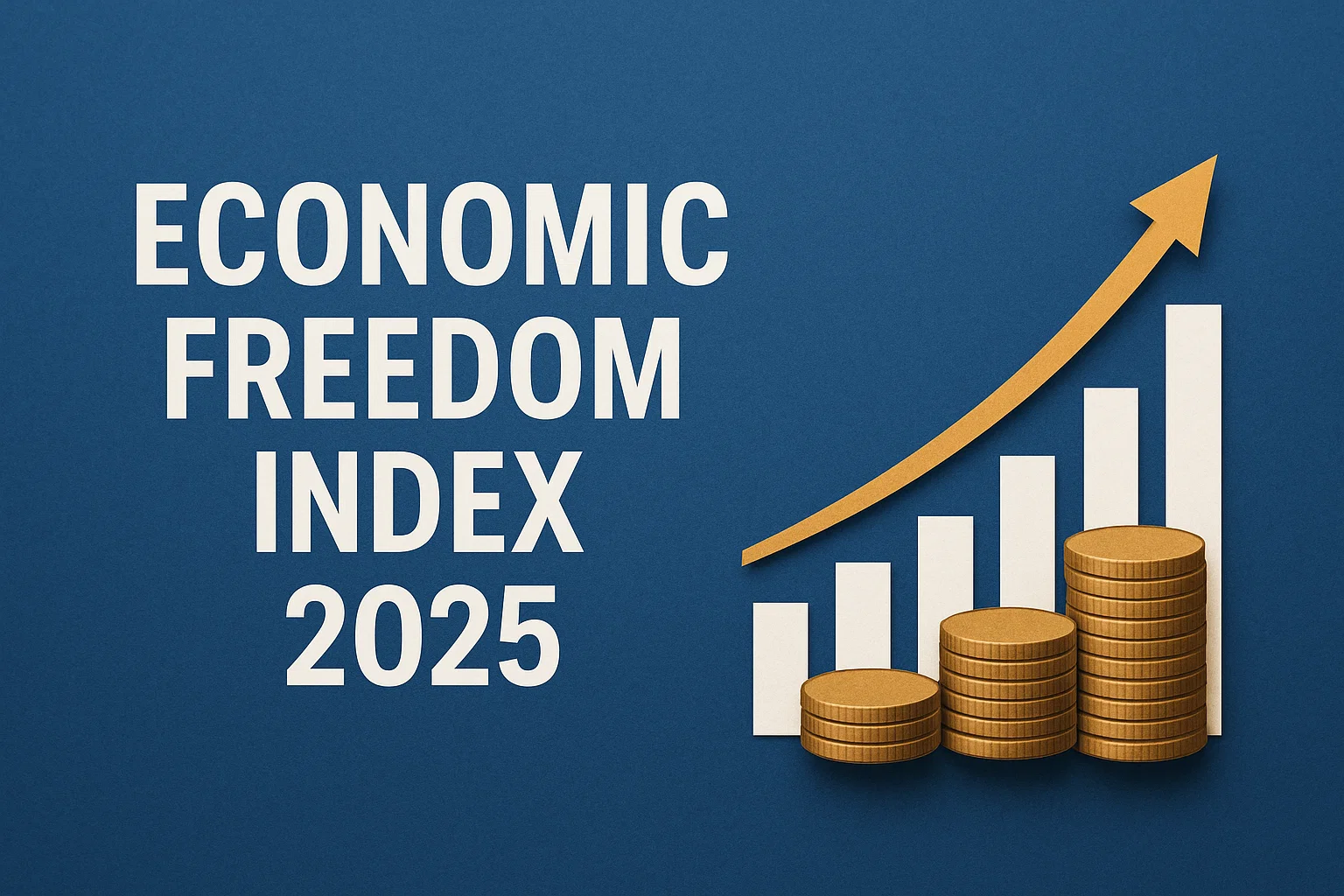Economic Freedom Index 2025
Explore India’s position at 128th in the 2025 Economic Freedom Index, the factors pulling down its score, global trends, and policy reforms needed to enhance investment, entrepreneurship, and fiscal health.
Context
The 2025 Economic Freedom Index, released by The Heritage Foundation, evaluates the economic policies and institutions of 184 countries based on data from July 2023 to June 2024. The index measures economic freedom through parameters like property rights, government integrity, regulatory efficiency, fiscal health, and labour and business freedom. India has been ranked 128th, with a score of 53 out of 100, classifying it as “Mostly Unfree”, marking its lowest score in seven years. This ranking raises concerns about the investment climate, entrepreneurship, and overall economic governance in the country.
Key Findings of the Index
India’s Position:
India’s score of 53/100 places it in the “Mostly Unfree” category, highlighting challenges in government integrity, regulatory efficiency, labour freedom, and fiscal stability.
Top Performers Globally:
The countries topping the index include Singapore, Switzerland, Ireland, and Taiwan, demonstrating a correlation between economic freedom and prosperity. Nations with higher economic freedom typically enjoy higher standards of living, better education systems, healthier environments, and greater employment opportunities.
Global Trends:
Globally, the average score improved marginally from 58.6 to 59.7, yet a significant number of countries remain “mostly unfree.” This trend underscores persistent regulatory and governance hurdles worldwide.
Notable Movements:
-
The United States slipped to its historic low, ranking 26th with a score of 70.2, primarily due to increased government spending and fiscal deficits.
-
Argentina achieved substantial gains through fiscal and regulatory reforms under President Javier Milei, illustrating how policy reforms can rapidly improve economic freedom.
Factors Contributing to India’s Decline
Several structural and policy-related issues have contributed to India’s lower ranking:
Weak Government Integrity:
Persistent corruption, lack of transparency, and administrative inefficiencies undermine business operations and deter investor confidence. Bribery, discretionary powers, and opaque processes in government procurement and licensing exacerbate these challenges.
Limited Labour Freedom:
India’s rigid labour laws restrict workforce flexibility, making it difficult to hire or terminate employees. Cumbersome regulations and restrictions on workforce mobility reduce competitiveness and discourage entrepreneurship. The impact is particularly felt in manufacturing and start-up sectors where agility is essential.
Poor Fiscal Health:
High public debt, rising fiscal deficits, and inefficient government spending weaken overall economic stability. The crowding out of private investment by excessive government borrowing reduces funds available for productive private-sector initiatives.
Burdensome Bureaucracy:
Entrepreneurs face lengthy, complicated procedures to start a business, obtain licenses, and comply with regulatory requirements. Multiple agencies often demand overlapping documentation, creating delays and uncertainty. The absence of a fully functional single-window clearance system further complicates the process.
Regulatory Restrictions:
Discretionary powers in inspections, licensing, and compliance create unpredictability. Overlapping laws at central, state, and municipal levels impede smooth business operations. Excessive regulatory oversight discourages formalisation of businesses and affects ease of doing business.
Implications for India
India’s performance in the Economic Freedom Index has several critical implications:
Investment and Growth:
A low ranking signals to domestic and international investors that policy unpredictability, bureaucratic hurdles, and regulatory inefficiencies remain a concern. This may slow capital inflows, technology adoption, and industrial growth.
Entrepreneurship:
Entrepreneurs face significant friction due to labour restrictions, fiscal instability, and regulatory complexities. Start-ups and small businesses may be deterred from formalising, impacting innovation and job creation.
Global Competitiveness:
Compared to top performers such as Singapore and Switzerland, India’s relatively low score undermines its position as a preferred destination for high-quality investment and skilled talent.
Policy Lessons:
India’s declining ranking highlights the need for structural reforms:
-
Strengthening government integrity and transparency.
-
Simplifying labour laws and improving workforce mobility.
-
Rationalising regulatory processes and implementing single-window clearances.
-
Improving fiscal discipline and redirecting government spending toward growth-enhancing sectors.
Conclusion
The 2025 Economic Freedom Index underscores that India faces significant structural, regulatory, and governance challenges. While it remains one of the fastest-growing major economies, limitations in policy transparency, bureaucratic efficiency, labour freedom, and fiscal health hinder the country’s potential. Addressing these issues through targeted reforms can improve ease of doing business, attract foreign and domestic investment, and enhance India’s long-term economic competitiveness. A higher economic freedom score would not only strengthen growth but also improve the overall quality of life for its citizens.
Subscribe to our Youtube Channel for more Valuable Content – TheStudyias
Download the App to Subscribe to our Courses – Thestudyias
The Source’s Authority and Ownership of the Article is Claimed By THE STUDY IAS BY MANIKANT SINGH






